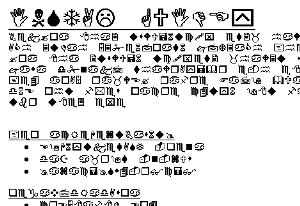A Peek Into Our Future
by in Feature Articles on 2006-08-31 Ishai Sagi, a fourth-year student at (where else) WTF-U, was in a bit of a bind. It was an early Saturday morning (translation: 1:00 PM) and Ishai had set aside the next forty or so hours to finish up (translation: start) a major assignment for his senior-level programming classes that was due on Monday. The problem was that the code libraries required for the assignment weren't available on the professor's web page as he said they would be.
Ishai Sagi, a fourth-year student at (where else) WTF-U, was in a bit of a bind. It was an early Saturday morning (translation: 1:00 PM) and Ishai had set aside the next forty or so hours to finish up (translation: start) a major assignment for his senior-level programming classes that was due on Monday. The problem was that the code libraries required for the assignment weren't available on the professor's web page as he said they would be.
He called a few of his classmates only to find that they too were unable to "finish up" the assignment. There's nothing surprising with that: I recently read (translation: made up) some statistics showing that 99.86% of students never actually read assignments until the night or weekend before they are due.

 Jul 06
Jul 06 Andreas had a pretty good idea of what he was getting in to. The job posting subtly included the duty of "helping to straighten up the software environment." The technical screening consisted of three questions: what is HTML, what is PHP, and what is SQL. And the interviewer subtly mentioned that the previous programmer was a "great guy, but had a few quirks." Yes, Andreas knew he was walking into a nicely presented system that's more messed-up than a building flattened with a 2-ton bomb ... shortly after being flattened with a 5-ton bomb. But that's OK; it would be a challenge.
Andreas had a pretty good idea of what he was getting in to. The job posting subtly included the duty of "helping to straighten up the software environment." The technical screening consisted of three questions: what is HTML, what is PHP, and what is SQL. And the interviewer subtly mentioned that the previous programmer was a "great guy, but had a few quirks." Yes, Andreas knew he was walking into a nicely presented system that's more messed-up than a building flattened with a 2-ton bomb ... shortly after being flattened with a 5-ton bomb. But that's OK; it would be a challenge.
 It ain't easy being number one, especially for R.B.'s company. With €730 million in annual revenues, they're the leader in a relatively small (€1.6 billion) niche market and are constantly struggling to maintain their dominance amongst a handful of vicious competitors. Recently, an executive at the company came up with an astonishingly brilliant plan that would ensure that they stayed on top for many years to come. This plan was named The Convergence.
It ain't easy being number one, especially for R.B.'s company. With €730 million in annual revenues, they're the leader in a relatively small (€1.6 billion) niche market and are constantly struggling to maintain their dominance amongst a handful of vicious competitors. Recently, an executive at the company came up with an astonishingly brilliant plan that would ensure that they stayed on top for many years to come. This plan was named The Convergence. When I first shared the story of
When I first shared the story of  For the longest time now, I've held the belief that best words to describe highly-specialized control software are "ridiculously expensive" and "marginally functioning." Maybe I'm wrong, but this story from Brandon Jones certainly doesn't help change my mind.
For the longest time now, I've held the belief that best words to describe highly-specialized control software are "ridiculously expensive" and "marginally functioning." Maybe I'm wrong, but this story from Brandon Jones certainly doesn't help change my mind. Don't worry, we won't be returning to WTF University this entire week; just today so that I may share one of Jim Roalef's many experiences in the Student Information Systems department at WTFU. Jim worked for Tom, the full-time Lead Programmer, who lorded it over his student subordinates. Tom believed that, despite only having a solid year of experience outside of his eighteen years at WTFU, he was The Chosen One, responsible for introducing "his students" into the Real World. To give you an idea of Tom's Rule, consider the following.
Don't worry, we won't be returning to WTF University this entire week; just today so that I may share one of Jim Roalef's many experiences in the Student Information Systems department at WTFU. Jim worked for Tom, the full-time Lead Programmer, who lorded it over his student subordinates. Tom believed that, despite only having a solid year of experience outside of his eighteen years at WTFU, he was The Chosen One, responsible for introducing "his students" into the Real World. To give you an idea of Tom's Rule, consider the following.
 Every once in a while, some one shares with me the story of an unimaginably convoluted system. A system so complex, so twisted that the mere thought of maintaining it has driven many a men insane. A system so heinous and so evil that the souls it has claimed are outnumbered only by COBOL itself. So, in hopes that its presentation might offer some consolation to John and its other unfortunate victims, I will share with you the story of The Customer-Friendly System.
Every once in a while, some one shares with me the story of an unimaginably convoluted system. A system so complex, so twisted that the mere thought of maintaining it has driven many a men insane. A system so heinous and so evil that the souls it has claimed are outnumbered only by COBOL itself. So, in hopes that its presentation might offer some consolation to John and its other unfortunate victims, I will share with you the story of The Customer-Friendly System.
 Jeremy was kind enough to share a "live WTF" with us all. Although I receive a fair number of submissions that point to a publicly accessible website, I rarely link to the site in question. As bad as it is that Mom-And-Pop-Store.com has a "SqlString" parameter on their viewProduct page, I doubt they'd appreciate it when someone went and replaced "SELECT ... WHERE ProductId=43" with "DROP DATABASE". Not that any of you would do that or anything.
Jeremy was kind enough to share a "live WTF" with us all. Although I receive a fair number of submissions that point to a publicly accessible website, I rarely link to the site in question. As bad as it is that Mom-And-Pop-Store.com has a "SqlString" parameter on their viewProduct page, I doubt they'd appreciate it when someone went and replaced "SELECT ... WHERE ProductId=43" with "DROP DATABASE". Not that any of you would do that or anything.
 M Mooney works in a fairly standard internal application development environment. His group writes code, packages it up, and sends it off the Infrastructure Group for deployment to the QA servers. Like many organizations, M's group has virtually no access to these servers. If they're lucky, they can use the application as an end-user would. If they're really lucky, they can directly access the server log files.
M Mooney works in a fairly standard internal application development environment. His group writes code, packages it up, and sends it off the Infrastructure Group for deployment to the QA servers. Like many organizations, M's group has virtually no access to these servers. If they're lucky, they can use the application as an end-user would. If they're really lucky, they can directly access the server log files.
 I've decided. My first official act as Chief Executive Officer will be to hire a Yes Man. Think about it: how could there possibly be a better way to receive feedback? I'll come up with some great, big idea and, just before I had a chance to realize how truly brilliant it is, I'll have some one already there, enumerating its pros and pros.
I've decided. My first official act as Chief Executive Officer will be to hire a Yes Man. Think about it: how could there possibly be a better way to receive feedback? I'll come up with some great, big idea and, just before I had a chance to realize how truly brilliant it is, I'll have some one already there, enumerating its pros and pros.
 Everyone knows that, when it comes down to it, it's all about the threads. Now, most coders ... they only use a single thread. Heck, some probably don't even realize that they're even codin' on a thread. All they know is that they write code, the computer runs it, and that's that. But the true, hard-core, and if I may say, gangsta' coders ... *they* go multi-threaded.
Everyone knows that, when it comes down to it, it's all about the threads. Now, most coders ... they only use a single thread. Heck, some probably don't even realize that they're even codin' on a thread. All they know is that they write code, the computer runs it, and that's that. But the true, hard-core, and if I may say, gangsta' coders ... *they* go multi-threaded.
 I'm sure we've all heard an old-timer gruff "burglar alarm system? pmmfff! When I was a kid, we left all of our windows and doors open, and the only burglar alarm we needed was a Labrador; and we were all fine!" Yeah, yeah, whatever you say, old man.
I'm sure we've all heard an old-timer gruff "burglar alarm system? pmmfff! When I was a kid, we left all of our windows and doors open, and the only burglar alarm we needed was a Labrador; and we were all fine!" Yeah, yeah, whatever you say, old man.
 A long time ago in a paradigm far, far away, a sage by the name of Fred Brooks proclaimed that a good programmer is ten times as productive as a not-so-good programmer. And then, things were Good; Believers knew the Word of Brooks and followed It.
A long time ago in a paradigm far, far away, a sage by the name of Fred Brooks proclaimed that a good programmer is ten times as productive as a not-so-good programmer. And then, things were Good; Believers knew the Word of Brooks and followed It.